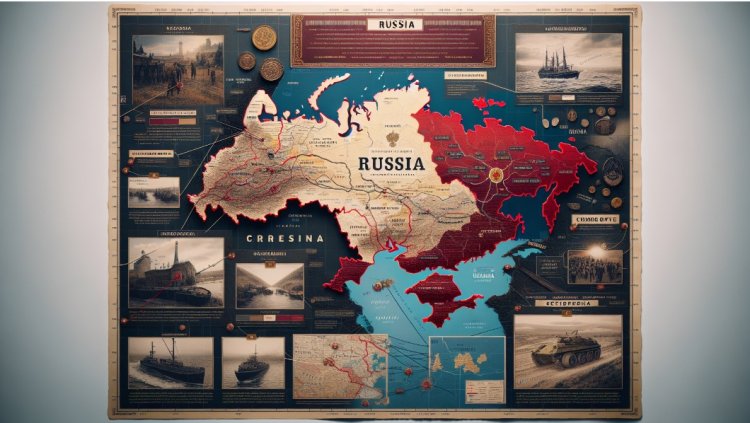Russia's Border Crisis: From Crimea to Ukraine
Tensions simmer as Russia's border actions raise fears of escalating conflict. Unravel the complexities of the crisis – from Crimea's annexation to the current standoff in Ukraine.

Introduction
Russia's border crisis has become a major concern in recent years, particularly with its aggression towards neighbouring countries. Understanding the historical context is crucial to comprehending the current situation. Russia's invasion of Ukraine in 2014 and the annexation of Crimea have heightened tensions and raised alarm among neighbouring countries. The importance of this border crisis cannot be understated, as it has the potential to destabilise the entire region and impact global powers such as the US and China.
Russia's historical expansionist tendencies and its desire for a buffer zone between Moscow and its enemies have fueled its aggression towards neighbouring countries. Throughout history, Russia has annexed territories, disputed border lines, and exerted control over regions it deems necessary for its security. The collapse of the Soviet Union in 1991 further complicated border disputes and territorial claims.
Recent events in Ukraine have brought the border crisis to the forefront of international attention. Russia's invasion of Ukraine and the ongoing conflict in the Donbass region have resulted in a devastating war that has caused significant casualties on both sides. This conflict has not only impacted Ukraine but has also strained relations between Russia and other countries, including the US and European nations.
It is crucial to understand the complexity and gravity of Russia's border crisis to fully comprehend the potential ramifications for regional stability and global politics. The ongoing tensions and territorial disputes pose a significant challenge to international diplomacy and require careful navigation to prevent further escalation.
Historical Background: Russia's Expansion and Collapse
Russia's historical expansion and collapse have played a significant role in shaping its present-day border crisis. Understanding this historical background is crucial to comprehending the current situation and the potential future outcomes.
Throughout history, Russia has had a tendency for expansion, annexing territories, and exerting control over regions it deems necessary for its security. The collapse of the Soviet Union in 1991 further complicated border disputes and territorial claims. Lessons learned from previous collapses have provided valuable insights for understanding the current stability in Russia.
Comparisons can be drawn between the stability of current Russia and previous collapses in Russian history. The stability in the 1980s before the Soviet Union collapsed and the stability in the 1910s before the Russian Empire collapsed are prime examples. These similarities highlight the potential risks and challenges that Russia may face in maintaining its stability.
However, it is important to note that historical patterns do not necessarily guarantee future outcomes. The current stability in Russia may be attributed to various factors, such as political strategies, economic stability, and diplomatic efforts. Therefore, while historical background provides valuable context, it is important to analyse the specific dynamics of the current border crisis and its potential implications.
Russian Collapse in the 21st Century
Russia's border crisis with Ukraine and its annexation of Crimea have raised concerns about the potential collapse of Russia in the 21st century. The following points highlight the possible scenarios, their impact on global and regional powers, concerns about Russia's nuclear arsenal, possible disagreements between superpowers, and the economic consequences of a collapse.
Possible Scenarios of a Collapse in the 21st Century
A collapse of Russia in the 21st century could take several forms. It could involve internal political and economic instability, ethnic tensions leading to separatist movements, or even a military conflict with neighbouring countries. The disintegration of the Soviet Union in 1991 provides some historical context for understanding the potential scenarios.
Potential Impact on Global and Regional Powers
A collapse of Russia would have significant ramifications for both global and regional powers. Global powers such as the United States and China would need to navigate the aftermath of a collapse and potentially deal with a power vacuum in the region. The potential for instability and territorial disputes would also have an impact on regional powers, including European countries and nearby nations like Ukraine.
Concerns about Russia's Nuclear Arsenal
One of the major concerns surrounding the collapse of Russia is the fate of its nuclear arsenal. Russia possesses one of the largest nuclear arsenals in the world, and the potential for these weapons to fall into dangerous hands is a major global security concern. It would be crucial for international powers to prevent any unauthorised access to or use of these weapons in the event of a collapse.
Possible Disagreements between Superpowers
A collapse of Russia could also lead to disagreements between superpowers such as the United States, China, and potentially other global powers. These disagreements could arise from differing interests and the desire to fill the power vacuum left by Russia's collapse. It could also lead to increased tensions and potential conflicts as different powers jockey for influence in the region.
Economic Consequences of a Collapse
A collapse of Russia would have significant economic consequences, both for the country itself and for global markets. Russia is a major player in the global energy market, particularly as a supplier of oil and natural gas. A collapse could disrupt these markets and lead to increased prices and potential shortages. It would also impact global trade and investment, as Russia is an important economic player.
Border Disputes: Japan and the Kuril Islands
The border dispute between Japan and Russia over the Kuril Islands has been a longstanding issue between the two countries. This section will provide an overview of the dispute, its historical context, territorial claims, and the impact it has on Russia-Japan relations.
Overview of the Russia-Japan Border Dispute
The border dispute between Russia and Japan revolves around the Kuril Islands, a chain of islands located between Russia's Kamchatka Peninsula and Japan's Hokkaido island. Both countries claim sovereignty over the islands, and the dispute has been ongoing since the end of World War II.
Historical Context of the Dispute
The historical context of the dispute dates back to the end of World War II, when the Soviet Union occupied the Kuril Islands, which were previously under Japanese control. The Soviet Union's occupation of the islands and the subsequent refusal to return them to Japan have been major points of contention between the two countries.
Territorial Claims and Disagreements
Russia claims sovereignty over the entire Kuril Islands chain, which consists of 18 islands. Japan, on the other hand, disputes Russia's claim and argues that only the four southernmost islands (Iturup, Kunashir, Shikotan, and Habomai) should be considered part of the dispute. Japan argues that these islands are historically and geographically part of Hokkaido and should be returned to Japanese control.
The importance of the Kuril Islands for Russia
The Kuril Islands are strategically important for Russia due to their geographical location and natural resources. The islands provide Russia with access to the Pacific Ocean and a buffer zone between its mainland and potential threats from the east. Additionally, the region is rich in natural resources, including fish, oil, and gas reserves, which contribute to Russia's economy.
Impact on Russia-Japan Relations
The ongoing border dispute over the Kuril Islands has strained Russia-Japan relations. The inability to resolve the dispute and reach a mutually acceptable agreement has hindered diplomatic efforts and hindered the development of closer economic and political ties between the two countries. The dispute continues to be a point of tension and has a significant impact on bilateral relations.
Border Disputes: China and the Amur River
Border disputes are not uncommon between countries, and one such dispute exists between China and Russia along the Amur River. This section will provide an overview of the Russia-China border dispute, the historical context of the dispute, the significance of the Amur River, the territorial claims and negotiations, and the resolution of the dispute.
Overview of the Russia-China Border Dispute
The border dispute between Russia and China primarily centres around the Amur River, which forms a natural boundary between the two countries. Both Russia and China have made territorial claims over certain areas along the river, leading to tensions and negotiations between the two nations.
Historical Context of the Dispute
The historical context of the Russia-China border dispute dates back to the 19th century, when the two countries established their first official ties. The Treaty of Shimoda in 1855 and the Treaty of St. Petersburg in 1875 defined the borders between Russia and China, but translation discrepancies and historical events led to ambiguity over the ownership of certain islands in the Amur River.
Significance of the Amur River
The Amur River holds significant strategic and economic importance for both Russia and China. It serves as a major transportation route and a valuable source of freshwater and fish. The river also plays a crucial role in the energy sector, with hydropower plants along its banks providing electricity to both countries.
Territorial Claims and Negotiations
Both Russia and China have made competing territorial claims along the Amur River, specifically regarding the ownership of certain islands. Russia claims sovereignty over the entire Amur River and its islands, while China disputes this claim and argues that only specific islands should be considered part of the dispute.
Negotiations between Russia and China have taken place over the years to resolve the border dispute. These negotiations have focused on finding a mutually acceptable agreement regarding the ownership of the islands and ensuring the long-term stability of the border region.
Resolution of the Dispute
The border dispute between Russia and China remains ongoing, with no definitive resolution at this time. However, both countries have made efforts to maintain peaceful relations and prevent further escalation of tensions. Diplomatic negotiations, economic cooperation, and cultural exchanges have been employed to promote understanding and alleviate the border dispute.
Border Disputes: Ukraine and Crimea
Border disputes have been a major source of tension for Russia, particularly with its aggression towards Ukraine. The conflict between Russia and Ukraine began in 2014, when Russia invaded Ukraine and annexed Crimea. This move was widely condemned by the international community and led to increased tensions between Russia and other countries, including the US and European nations.
Russia's aggression towards Ukraine stems from its historical expansionist tendencies and its desire for a buffer zone between Moscow and its enemies. The collapse of the Soviet Union in 1991 further complicated border disputes and territorial claims. Russia's actions in Ukraine represent a continuation of its historical pattern of annexing territories and exerting control over regions it deems necessary for its security.
The annexation of Crimea in 2014 had a significant impact on Ukraine and international relations. Ukraine lost control of a region that had historical and cultural significance, and it sparked a conflict in eastern Ukraine between pro-Russian separatists and Ukrainian government forces. This conflict has resulted in a devastating war, with significant casualties on both sides.
The ongoing conflict in eastern Ukraine has strained relations between Russia and other countries. The US and European nations have imposed sanctions on Russia in response to its aggression towards Ukraine. These sanctions have had a negative impact on Russia's economy and have further isolated the country internationally.
The conflict in Ukraine has also had significant humanitarian and economic consequences. The war has caused massive displacement of people, with millions of Ukrainians being forced to flee their homes. There have also been reports of human rights abuses and violations of international law in the conflict zone.
Economically, the conflict has disrupted trade and investment in the region, leading to a decline in economic growth and development. Ukraine has faced significant challenges in rebuilding its economy and infrastructure, while Russia has had to bear the economic costs of its military intervention in Ukraine.
The border disputes between Russia and Ukraine, particularly the annexation of Crimea and the ongoing conflict in eastern Ukraine, have had far-reaching implications for regional stability and global politics. The resolution of these disputes will require diplomatic efforts and a commitment to upholding international law and principles.
Other border disputes
Russia has been involved in several border disputes with other countries, highlighting the complexity of its border crisis and its impact on regional and global relations.
Russia's Border Disputes with Other Countries
One of the notable border disputes involving Russia is its claim to Alaska and the Arctic. Russia's historical claims on Alaska date back to the 19th century, when it sold the territory to the United States. However, there has been some renewed interest in the region due to its natural resources and strategic importance. Additionally, Russia has been involved in territorial disputes with Norway and Finland, particularly over the control of certain islands and border regions.
Russia's Claims on Alaska and the Arctic
Russia's historical claims on Alaska stem from its past ownership of the territory, which it sold to the United States in 1867. However, in recent years, there has been renewed interest in the region due to its vast oil and gas reserves, as well as its potential for increased shipping routes and access to the Arctic. These claims by Russia have raised concerns among other Arctic nations, including the United States and Canada, about Russia's intentions and its impact on regional stability.
Border disputes with Norway and Finland
Russia has been involved in border disputes with both Norway and Finland over certain islands and border regions. In the case of Norway, the dispute revolves around the control of the Svalbard archipelago, which is located in the Arctic Ocean. Russia has also been involved in border disputes with Finland, particularly over the control of certain islands and regions along their shared border. These disputes have created tensions between Russia and these neighbouring countries and have the potential to impact regional stability.
Impact on Regional and Global Relations
These border disputes have significant implications for regional and global relations. They have the potential to strain diplomatic relations between Russia and other countries involved in the disputes. Additionally, they can impact regional stability and security, as well as economic cooperation and trade between the countries involved. The resolution of these disputes requires careful negotiation and diplomatic efforts to ensure a peaceful and mutually acceptable outcome.
Conclusion
In conclusion, Russia's border crisis, particularly with Ukraine and other neighbouring countries, has significant implications for regional stability and global politics. The historical context of Russia's expansion and collapse, along with its desire for a buffer zone and control over strategic territories, has fueled its aggression towards its neighbours. The ongoing conflicts and territorial disputes pose a challenge to international diplomacy and have the potential to destabilise the entire region.
Monitoring and addressing the border crisis are of utmost importance. The summary of Russia's border crisis highlights the annexation of Crimea and the ongoing conflict in Ukraine. The importance of these issues cannot be understated, as they have resulted in significant casualties, strained relations between Russia and other countries, and economic consequences for the region.
The potential implications for global stability are significant. The collapse of Russia in the 21st century would have far-reaching consequences, including concerns about its nuclear arsenal, disagreements between superpowers, and economic disruptions. Diplomatic efforts are needed to prevent further escalation and find peaceful resolutions to border disputes.
In conclusion, the border crisis in Russia requires careful monitoring, diplomatic resolutions, and international cooperation to ensure regional stability and global peace.



 admin
admin 










